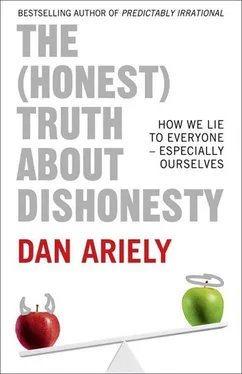Ariely, Dan - The (Honest) Truth About Dishonesty - How We Lie to Everyone – Especially Ourselves
Здесь есть возможность читать онлайн «Ariely, Dan - The (Honest) Truth About Dishonesty - How We Lie to Everyone – Especially Ourselves» весь текст электронной книги совершенно бесплатно (целиком полную версию без сокращений). В некоторых случаях можно слушать аудио, скачать через торрент в формате fb2 и присутствует краткое содержание. Жанр: Старинная литература, на английском языке. Описание произведения, (предисловие) а так же отзывы посетителей доступны на портале библиотеки ЛибКат.
- Название:The (Honest) Truth About Dishonesty: How We Lie to Everyone – Especially Ourselves
- Автор:
- Жанр:
- Год:неизвестен
- ISBN:нет данных
- Рейтинг книги:4 / 5. Голосов: 1
-
Избранное:Добавить в избранное
- Отзывы:
-
Ваша оценка:
- 80
- 1
- 2
- 3
- 4
- 5
The (Honest) Truth About Dishonesty: How We Lie to Everyone – Especially Ourselves: краткое содержание, описание и аннотация
Предлагаем к чтению аннотацию, описание, краткое содержание или предисловие (зависит от того, что написал сам автор книги «The (Honest) Truth About Dishonesty: How We Lie to Everyone – Especially Ourselves»). Если вы не нашли необходимую информацию о книге — напишите в комментариях, мы постараемся отыскать её.
The (Honest) Truth About Dishonesty: How We Lie to Everyone – Especially Ourselves — читать онлайн бесплатно полную книгу (весь текст) целиком
Ниже представлен текст книги, разбитый по страницам. Система сохранения места последней прочитанной страницы, позволяет с удобством читать онлайн бесплатно книгу «The (Honest) Truth About Dishonesty: How We Lie to Everyone – Especially Ourselves», без необходимости каждый раз заново искать на чём Вы остановились. Поставьте закладку, и сможете в любой момент перейти на страницу, на которой закончили чтение.
Интервал:
Закладка:
WHAT DO WEknow about the causes of dishonesty? In rational economics, the prevailing notion of cheating comes from the University of Chicago economist Gary Becker, a Nobel laureate who suggested that people commit crimes based on a rational analysis of each situation. As Tim Harford describes in his book The Logic of Life , *the birth of this theory was quite mundane. One day, Becker was running late for a meeting and, thanks to a scarcity of legal parking, decided to park illegally and risk a ticket. Becker contemplated his own thought process in this situation and noted that his decision had been entirely a matter of weighing the conceivable cost—being caught, fined, and possibly towed—against the benefit of getting to the meeting in time. He also noted that in weighing the costs versus the benefits, there was no place for consideration of right or wrong; it was simply about the comparison of possible positive and negative outcomes.
And thus the Simple Model of Rational Crime (SMORC) was born. According to this model, we all think and behave pretty much as Becker did. Like your average mugger, we all seek our own advantage as we make our way through the world. Whether we do this by robbing banks or writing books is inconsequential to our rational calculations of costs and benefits. According to Becker’s logic, if we’re short on cash and happen to drive by a convenience store, we quickly estimate how much money is in the register, consider the likelihood that we might get caught, and imagine what punishment might be in store for us if we are caught (obviously deducting possible time off for good behavior). On the basis of this cost-benefit calculation, we then decide whether it is worth it to rob the place or not. The essence of Becker’s theory is that decisions about honesty, like most other decisions, are based on a cost-benefit analysis.
The SMORC is a very straightforward model of dishonesty, but the question is whether it accurately describes people’s behavior in the real world. If it does, society has two clear means for dealing with dishonesty. The first is to increase the probability of being caught (through hiring more police officers and installing more surveillance cameras, for example). The second is to increase the magnitude of punishment for people who get caught (for example, by imposing steeper prison sentences and fines). This, my friends, is the SMORC, with its clear implications for law enforcement, punishment, and dishonesty in general.
But what if the SMORC’s rather simple view of dishonesty is inaccurate or incomplete? If that is the case, the standard approaches for overcoming dishonesty are going to be inefficient and insufficient. If the SMORC is an imperfect model of the causes of dishonesty, then we need to first figure out what forces really cause people to cheat and then apply this improved understanding to curb dishonesty. That’s exactly what this book is about. *
Life in SMORCworld
Before we examine the forces that influence our honesty and dishonesty, let’s consider a quick thought experiment. What would our lives be like if we all strictly adhered to the SMORC and considered only the costs and benefits of our actions?
If we lived in a purely SMORC-based world, we would run a cost-benefit analysis on all of our decisions and do what seems to be the most rational thing. We wouldn’t make decisions based on emotions or trust, so we would most likely lock our wallets in a drawer when we stepped out of our office for a minute. We would keep our cash under the mattress or lock it away in a hidden safe. We would be unwilling to ask our neighbors to bring in our mail while we’re on vacation, fearing that they would steal our belongings. We would watch our coworkers like hawks. There would be no value in shaking hands as a form of agreement; legal contracts would be necessary for any transaction, which would also mean that we would likely spend a substantial part of our time in legal battles and litigation. We might decide not to have kids because when they grew up, they, too, would try to steal everything we have, and living in our homes would give them plenty of opportunities to do so.
Sure, it is easy to see that people are not saints. We are far from perfect. But if you agree that SMORCworld is not a correct picture of how we think and behave, nor an accurate description of our daily lives, this thought experiment suggests that we don’t cheat and steal as much as we would if we were perfectly rational and acted only in our own self-interest.
Calling All Art Enthusiasts
In April 2011, Ira Glass’s show, This American Life, 1featured a story about Dan Weiss, a young college student who worked at the John F. Kennedy Center for the Performing Arts in Washington, D.C. His job was to stock inventory for the center’s gift shops, where a sales force of three hundred well-intentioned volunteers—mostly retirees who loved theater and music—sold the merchandise to visitors.
The gift shops were run like lemonade stands. There were no cash registers, just cash boxes into which the volunteers deposited cash and from which they made change. The gift shops did a roaring business, selling more than $400,000 worth of merchandise a year. But they had one big problem: of that amount, about $150,000 disappeared each year.
When Dan was promoted to manager, he took on the task of catching the thief. He began to suspect another young employee whose job it was to take the cash to the bank. He contacted the U.S. National Park Service’s detective agency, and a detective helped him set up a sting operation. One February night, they set the trap. Dan put marked bills into the cash-box and left. Then he and the detective hid in the nearby bushes, waiting for the suspect. When the suspected staff member eventually left for the night, they pounced on him and found some marked bills in his pocket. Case closed, right?
Not so, as it turned out. The young employee stole only $60 that night, and even after he was fired, money and merchandise still went missing. Dan’s next step was to set up an inventory system with price lists and sales records. He told the retirees to write down what was sold and what they received, and—you guessed it—the thievery stopped. The problem was not a single thief but the multitude of elderly, well-meaning, art-loving volunteers who would help themselves to the goods and loose cash lying around.
The moral of this story is anything but uplifting. As Dan put it, “We are going to take things from each other if we have a chance … many people need controls around them for them to do the right thing.”
THE PRIMARY PURPOSEof this book is to examine the rational cost-benefit forces that are presumed to drive dishonest behavior but (as you will see) often do not, and the irrational forces that we think don’t matter but often do. To wit, when a large amount of money goes missing, we usually think it’s the work of one coldhearted criminal. But as we saw in the art lovers’ story, cheating is not necessarily due to one guy doing a cost-benefit analysis and stealing a lot of money. Instead, it is more often an outcome of many people who quietly justify taking a little bit of cash or a little bit of merchandise over and over. In what follows we will explore the forces that spur us to cheat, and we’ll take a closer look at what keeps us honest. We will discuss what makes dishonesty rear its ugly head and how we cheat for our own benefit while maintaining a positive view of ourselves—a facet of our behavior that enables much of our dishonesty.
Once we explore the basic tendencies that underlie dishonesty, we will turn to some experiments that will help us discover the psychological and environmental forces that increase and decrease honesty in our daily lives, including conflicts of interest, counterfeits, pledges, creativity, and simply being tired. We’ll explore the social aspects of dishonesty too, including how others influence our understanding of what’s right and wrong, and our capacity for cheating when others can benefit from our dishonesty. Ultimately, we will attempt to understand how dishonesty works, how it depends on the structure of our daily environment, and under what conditions we are likely to be more and less dishonest.
Читать дальшеИнтервал:
Закладка:
Похожие книги на «The (Honest) Truth About Dishonesty: How We Lie to Everyone – Especially Ourselves»
Представляем Вашему вниманию похожие книги на «The (Honest) Truth About Dishonesty: How We Lie to Everyone – Especially Ourselves» списком для выбора. Мы отобрали схожую по названию и смыслу литературу в надежде предоставить читателям больше вариантов отыскать новые, интересные, ещё непрочитанные произведения.
Обсуждение, отзывы о книге «The (Honest) Truth About Dishonesty: How We Lie to Everyone – Especially Ourselves» и просто собственные мнения читателей. Оставьте ваши комментарии, напишите, что Вы думаете о произведении, его смысле или главных героях. Укажите что конкретно понравилось, а что нет, и почему Вы так считаете.












